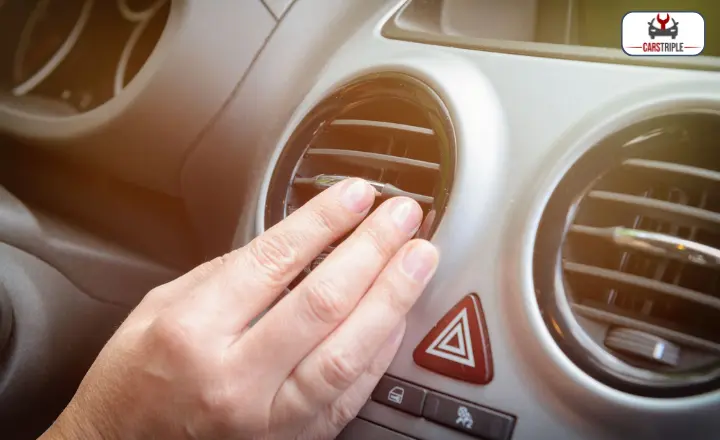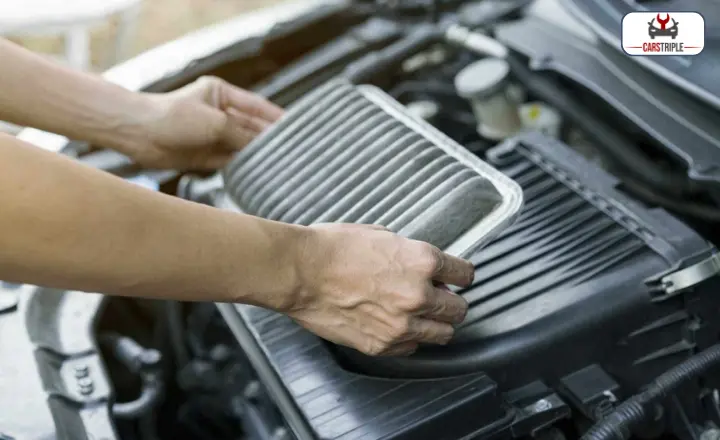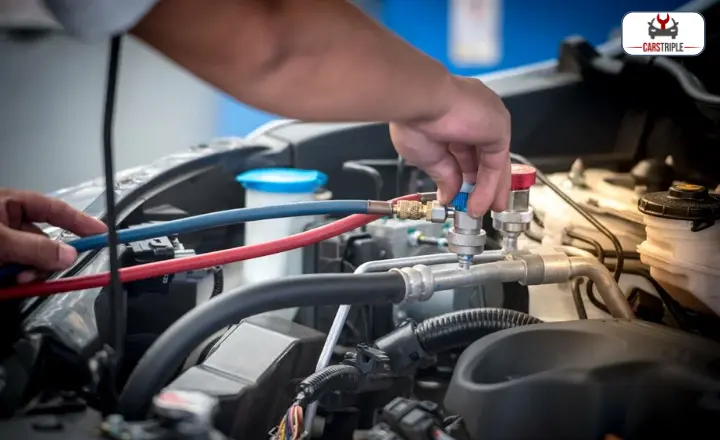Experienced the frustration of turning on your car’s air conditioning on a hot summer day, only to be greeted by a blast of hot air instead of the tremendous relief you were expecting. Many car owners have faced this perplexing issue, wondering why their AC blows hot air instead of cooling down their vehicle.
In this article, we will explore some common reasons behind car AC blowing hot air and provide possible solutions to help you understand why your car’s AC may malfunction and how to fix it.
Car AC Blowing Hot Air
Your car’s AC blows hot air instead of the refreshing coolness you crave during these scorching summer months. Tiny cracks or leaks can develop in the AC system, causing the refrigerant to escape. Without enough refrigerant circulating through the system, the air blown into your vehicle will not be adequately cooled.
Another explanation for warm air coming from your vents could be a faulty compressor clutch. The compressor plays a vital role in cooling the air by compressing and circulating the refrigerant gas throughout the system.
Reasons for A/C blowing Hot Air
Many individuals face this frustrating issue, and there are several reasons why your A/C may be malfunctioning. This guide will explore six common causes for an A/C system blowing hot air, helping you diagnose the problem and get back to enjoying a refreshing breeze inside your vehicle.

Condenser Fails
The condenser plays a vital role in dissipating heat from the refrigerant, allowing it to cool down before being circulated back into the cabin. Various issues can arise with this component, leading to ineffective cooling and discomfort during those scorching summer months.
A failing condenser is damage caused by road debris and rocks. As you drive, your vehicle’s front grille can quickly become a magnet for small stones, or debris kicked up from the road. When these objects hit the condenser fins, they can puncture or bend them out of shape.
Compressor or Pipes Leaking
The compressor is a vital component of your AC system that plays a crucial role in cooling the air. If it malfunctions or fails, it can lead to warm air being circulated throughout your car. Leaking pipes can cause refrigerant to escape and disrupt the cooling process.
It is one of the primary reasons your AC may blow hot air. The compressor is the heart of your cooling system by compressing and circulating refrigerant gas through its coils and converting it into liquid form for effective heat exchange.
If the compressor has an issue, such as a mechanical failure or electrical problem, it cannot properly perform its function.
The Gas Circuit is Leaking
The gas circuit includes various components, including the compressor, condenser, evaporator coil, and refrigerant lines. If any part of this circuit develops a leak, it can result in inadequate cooling or even complete failure of your A/C unit.
A common cause of leaks in the gas circuit is wear and tear over time. As your A/C system operates, vibrations and pressure fluctuations can gradually weaken connections between components or cause tiny cracks in refrigerant lines. These leaks allow the refrigerant, a vital element for heat exchange, to escape from the system.
Improper Maintenance of the Filter
The filter in your AC unit plays a crucial role in trapping dust, dirt, and other particles from entering the system. These trapped particles accumulate and clog up the filter, obstructing proper airflow. This obstruction prevents cool air from flowing through the system effectively and can blow hot or warm air into your living space.

Regularly changing or cleaning your AC filter is essential to prevent this issue. Neglecting to do so can lead to reduced cooling efficiency and increased strain on the unit’s components. Filters should be replaced every 3-6 months. More frequent replacements may be necessary if you live in an area with excessive dust or pollutants.
Blown Fuse
Fuses protect the electrical circuits in your A/C unit from overloading or short-circuiting. When a fuse blows, it disrupts the flow of electricity to specific components, which can lead to various issues and ultimately result in your A/C blowing warm instead of cold air.
The common reason for a blown fuse is a power surge or voltage spike. These sudden increases in electrical current can overload the circuit and cause the fuse to blow.
Old or faulty wiring within your home’s electrical system could also contribute to blown fuses. The wiring may become frayed or damaged, leading to increased resistance and potential overheating that could trigger a blown fuse.
Air Conditioner Box Failure
The malfunctioning air conditioner box component plays a significant role in cooling your car by regulating the refrigerant flow and ensuring it reaches the evaporator coils efficiently. A failed air conditioner box can result from various factors, one being a faulty blend door actuator.

This actuator controls the mixture of hot and cold air that enters your vehicle’s cabin based on your temperature settings. When it fails, it may get stuck in either the hot or cold position, preventing cold air from circulating effectively throughout your vehicle.
Conclusion
Dealing with a car AC blowing hot air can be frustrating. It is essential to address this issue promptly to ensure comfortable and safe driving conditions. By understanding the possible causes of this problem and taking appropriate measures such as checking refrigerant levels, inspecting the compressor, and cleaning or replacing the cabin air filter, drivers can effectively restore their car’s cooling system.
Regular maintenance and timely repairs are crucial to optimizing your car’s AC. Suppose you continue to experience issues with your car’s AC blowing hot air. It is advisable to seek professional help from an experienced mechanic who can accurately diagnose and fix the problem. I hope you understand why my car’s AC blows warm air.
FAQ’s
Does Blown AC waste a lot of fuel?
A blown AC does not waste fuel. The engine powers a car’s air conditioning system but does not directly consume fuel. It uses energy from the engine to compress and cool refrigerant, which then cools the air blown into the cabin. So even if the AC is blowing cold air continuously, it does not significantly impact fuel consumption.
Why is my car’s AC losing power?
The compressor may have trouble circulating the refrigerant and maintaining the cooling effect. If the compressor is not functioning correctly, it can result in reduced cooling power.
